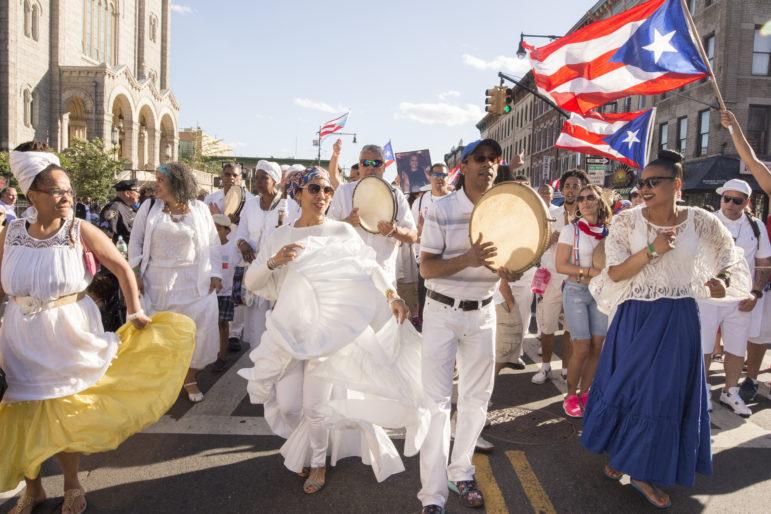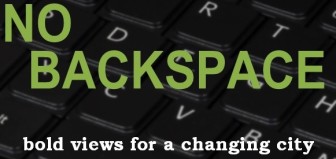
Salvador Espinoza
A scene from last year's Sunset Park Puerto Rican Parade, an event launched in 2014 as a response to police-community tension and an alternative to a Manhattan parade that some felt had grown too commercialized.
The moment NYPD Commissioner Jimmy O’Neill said he wouldn’t march in this year’s Puerto Rican Day parade over the inclusion of a recently-freed Oscar Lopez Rivera, the line in the political sand was obvious. Not only would O’Neill’s snub of the parade mark the first public split between him and Mayor Bill de Blasio—who has somewhat defended Lopez, a political prisoner who spent 36 years in prison for treason—but it has politicized the longtime parade to new levels.
As big names like JetBlue Airlines, Goya Foods, the New York Yankees and now AT&T also turn their backs on the parade, new attention has been drawn to a newer parade in Brooklyn organized by a local community group, El Grito de Sunset Park. In fact, El Grito organizers say that some of the same corporations boycotting the main parade are now inquiring as to whether they can sponsor the Sunset Park event. El Grito, however, says that they’ve turned down the offers.
Three years ago, Dennis Flores, founder of El Grito, decided to organize his own parade after years of tension between cops from the nearby 72nd precinct and the largely Puerto Rican and immigrant Sunset Park community. For years, parade-goers heading back to Sunset Park would continue the festivities in their neighborhood only to encounter harassment from the police, who would attempt to clear the streets of celebrators.
A 2014 incident when police violently arrested and charged a teenager was the last straw for Flores. A longtime copwatcher and neighborhood activist, Flores reached out to residents, artists, friends and local businesses to organize another parade so that people in Sunset Park would have the right to the streets. A Sunset Park Puerto Rican Day parade would ensure that the festivities could continue without police interruption.
The Sunset Park parade has been a resounding success, so much so that nowadays elected officials try to sneak in – only to have organizers chase them out. In addition to weeding out the police harassment and politicians, Sunset Park’s parade also brings out the culture. The last two years have featured a procession of local community groups, even domino clubs and antique cars decked out in Puerto Rican flags. Flores says the parade is “more traditional” than the Manhattan version, which he says “has been out of touch for a long time” and become increasingly “commercialized.” Instead of being inundated with corporate sponsors (who’ve now taken it upon themselves to tell Puerto Ricans whom to honor), Sunset Park’s parade allows for “the Puerto Rican people to really see a reflection of themselves,” Flores says.
While the boycotting companies who reached out to El Grito may be looking to sponsor another event in order to spite Lopez, they may not realize that Flores is not only a supporter of Lopez but also a vocal critic of the NYPD. Commissioner O’Neill found that out the hard way in 2014. After a series of controversial police brutality incidents in Sunset Park (namely the brutal takedown of a pregnant immigrant and a police melee with a family of street vendors), O’Neill, then chief of patrol, was one of several NYPD top officials who were booed at a raucous town hall organized by El Grito and others.
Flores is also a pro-independence Puerto Rican. He supports Lopez’s freedom and points to the hypocrisy of parade boycotters for condemning Lopez, who was never convicted of participating in violence. Where is the NYPD Hispanic Society, a fraternal group of active Latino cops also boycotting, when police kill or brutalize New Yorkers of color, he asks. Goya, founded by a Spaniard, has never feigned outrage over acts of violence against Puerto Rican independistas.
A good number of Puerto Ricans will remember 1978 Cerro Maravilla massacre back in Puerto Rico. Two pro-independence students were killed in a police ambush on their way to sabotage communication towers to protest the imprisonment of those imprisoned for an assassination attempt on President Harry Truman years earlier. After the Governor of Puerto Rico and the U.S. Justice Department found no wrongdoing by the officers (a recurring theme), new investigations found that the officers killed the students in cold blood and that there were signs of an official cover-up.
Puerto Rico’s past is crucial to understanding the issues simmering underneath the surface of the parade fracas today. The island’s colonial history sits at the heart of how many Puerto Ricans think not only about Lopez, but about the entire relationship between the island and the mainland. Within the Puerto Rican diaspora, you have flag-waving supporters of the U.S. vs. critics of the United States, supporters of Puerto Rican statehood vs. pro-independence activists. Many tie Puerto Rico’s history to the anti-colonial struggles of Latin America more broadly. There are controversies and stories about its flag, its national anthem (the original was replaced after it was deemed too subversive) and even its name (temporarily Americanized to “Porto Rico”).
In this context, it’s easy to see a New York police leader’s political boycott as small potatoes, maybe even a little ironic. After all, incidents of police brutality have been endemic to the Puerto Rican experience. And there is, however, something far more important that O’Neill, Flores notes: an important public vote on Puerto Rico’s political status is fast approaching. An island-wide referendum, known as a plebiscite, will be held on June 11th – the same day as the Puerto Rican Day parades in New York. It’s the fifth time in recent history that Puerto Ricans have been given the luxury of voting on their political status. In 2012, a plebiscite saw the majority of votes cast against the status quo of commonwealth. And though most votes for status went for statehood, it’s important to note that there was (ironically) a boycott of the vote by independence activists – producing nearly half a million empty ballots.
Last month, the United States (which can always be counted on to look over Puerto Rico’s shoulder), decided that Puerto Ricans wouldn’t just be voting on statehood or independence, which would make far too much sense, but that commonwealth status, which was rejected in 2012, would again be an option for the vote. (For those who claim that Russia unfairly influenced U.S. elections, please note the master class that the United States has put on in meddling not only in Puerto Rico’s elections, but also historically handpicking the island’s leaders. A good book on the island’s history is Nelson Dennis’ War Against All Puerto Ricans.)
Back to O’Neill. That a career cop would oppose someone like Lopez is unsurprising. People like O’Neill are supposed to hate left-wing political icons. That old saying about one man’s terrorist being another’s freedom fighter was literally made for situations like these. It will be interesting what side of the line in the sand some notable figures not only line up, but actually end up on. So far, the big parade organizers, along with Mayor de Blasio and City Council Speaker Melissa Mark Viverito, continue to endorse—or at least accept—the honor bestowed on Lopez. There will be pressure on them to flip. Meanwhile, there is now talk of a boycott of the companies who have pulled out protesting Lopez.
However, those may not be the biggest issues. Flores says that wants to turn the Sunset Park parade into a protest of sorts—not of O’Neill or of the corporations, but of how Puerto Rico has been used and abused for so long. He wants more local Puerto Ricans in the city to connect to the island think long and hard about bigger picture for Puerto Rico. Many here on the mainland are largely disconnected from the island’s history and political discussions, he says. If the city’s Puerto Rican community was outraged when Coors splashed the Puerto Rican flag on beer cans four years ago, perhaps more Puerto Ricans can be outraged that the US is meddling in the Puerto Rican plebiscite again.
The problem with the corporatization of the Puerto Rican Day parade, meanwhile, may have been solved by the flap over honoring Lopez. If corporations want to disassociate themselves from Puerto Ricans, let them. In fact, beginning to loosen the grip of the American business community on parades, and Puerto Ricans, may actually be the most poetic way to celebrate Oscar Lopez’ freedom.









6 thoughts on “CityViews: Police, Politics and the Puerto Rican Day Parade”
I will be at Sunset Park Parade this year. I was at the 1st but was unable to make the 2nd since my car broke down on 59st in Manhattan. Thank you Josmar for the article. Thanks Dennis Flores for shutting down the corporations. #IAmWithSunSetPark #IAmWithOscarLopez #DefiendeLoTuyo
Mr. Flores thank you for not accepting sponsorship from corporations and entities that do not respect us as equals.
i AM NOT PUETO RICAN, BUT I READ WAR AGAINST ALL PUETO RICANS AND IT MAKES ME SUPPORT INDEPENDENCE . I AM IN THE COLONY OF d.c. AND I UNDERSTAND WHAT THEY ARE FIGHTING!!. SOLIDARITY WITH ALL LIBERATION GROUPS!!
I wish Comrade Rivera would go back to PR and take Communist Democrat Melissa Mark-Viverito with him. When his time on earth is over, he will meet the true judge of men, Jesus Christ, who condemns the unrepentant to gehenna. The unrepentant will have all eternity to burn with his fellow revolutionaries: Castro, Che and their leader Lucifer. On June 11, I will remember in my prayers, the 4 innocent lives lost that day at Fraunces Tavern and the many others who were injured, orphaned, widowed and otherwise shattered by this wicked man’s treachery.
What day is the Sunset Park Parade and what time? Please.
Sunday June 11th at 5pm